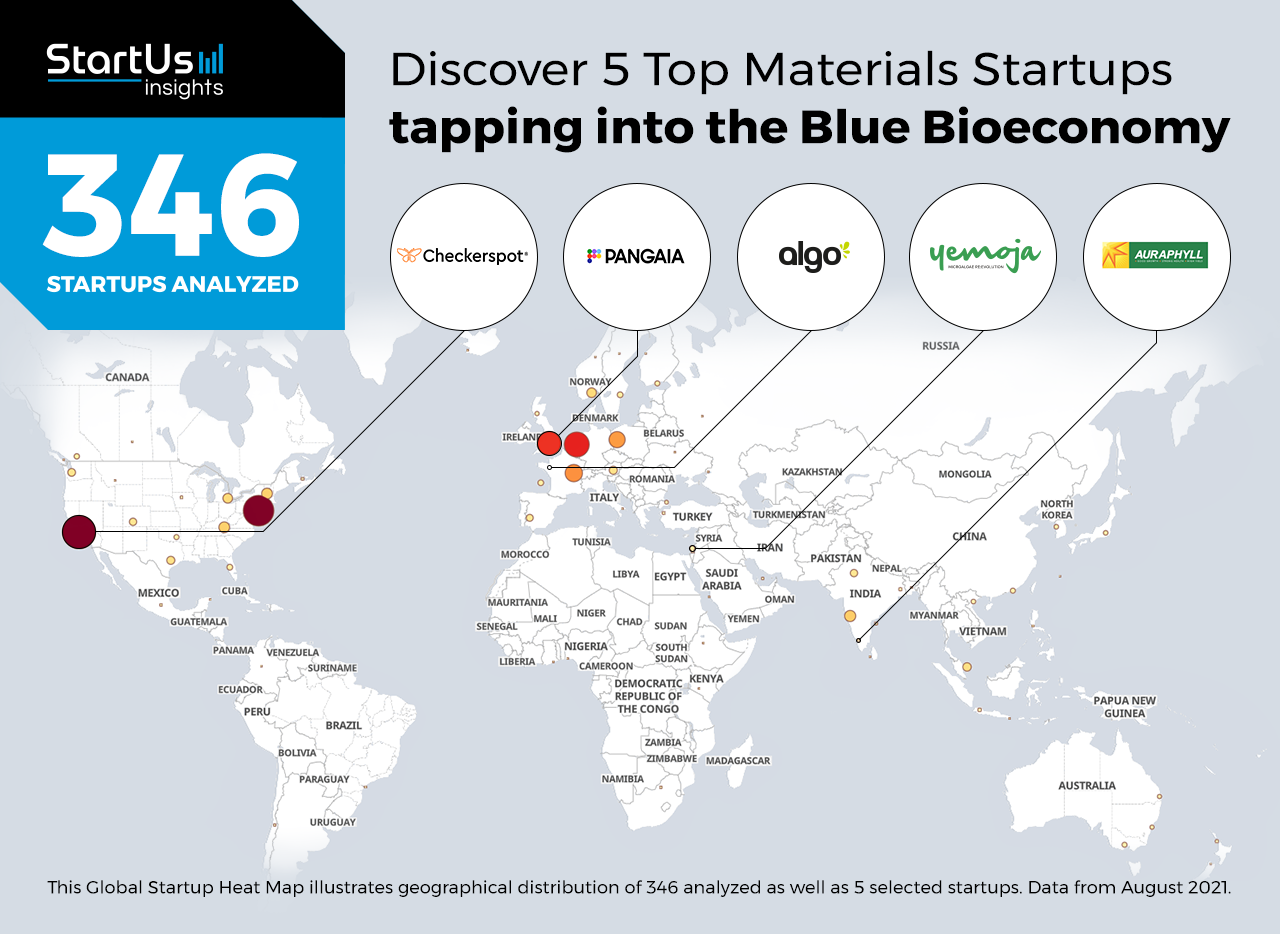Staying ahead of the technology curve means strengthening your competitive advantage. That is why we give you data-driven innovation insights into the materials industry. This time, you get to discover 5 hand-picked startups tapping into the blue bioeconomy.
Global Startup Heat Map highlights 5 Top Materials Startups tapping into the Blue Bioeconomy out of 346
The insights of this data-driven analysis are derived from the Big Data & Artificial Intelligence-powered StartUs Insights Discovery Platform, covering 2.093.000+ startups & scaleups globally. The platform gives you an exhaustive overview of emerging technologies & relevant startups within a specific field in just a few clicks.
The Global Startup Heat Map below reveals the distribution of the 346 exemplary startups & scaleups we analyzed for this research. Further, it highlights 5 materials startups that we hand-picked based on criteria such as founding year, location, funding raised, and more. You get to explore the solutions of these 5 startups & scaleups in this report. For insights on the other 341 startups tapping into the blue bioeconomy, get in touch.
Checkerspot creates Polyurethane (PU)
Polyurethane polymers find applications in packaging, fashion, electronics, and other industries. However, their production is resource-intensive and polluting. This is why materials startups are turning to biomass sources to create polyurethane. Marine biomass like algae or seaweed generates large quantities of sustainable biopolymers while sustaining coastal economies.
US-based startup Checkerspot designs and manufactures high-performance biomaterials. The startup’s WING platform engineers microalgae-based materials at the molecular level. Checkerspot Algal Core, the startup’s polyurethane foam, has a closed-cell structure, giving it high compressive strength and making it suitable for common layup techniques. The startup’s process creates sustainable materials while lowering the amount of waste and greenhouse gas (GHG) emissions.
PANGAIA makes Sustainable Fibers
Making fabrics for clothes involves the use of large quantities of water. Moreover, the process of harvesting plant-based fabrics and process them into textiles is energy-intensive at each step. To improve sustainability, materials startups are creating innovative fibers that require fewer resources to make. Seaweed, for example, is a viable and renewable alternative as it is rich in cellulosic fibers.
PANGAIA is a British startup that creates sustainable fibers. The startup’s C-FIBER technology combines seaweed powder and eucalyptus powder to create fabric. As seaweed grows naturally in oceans, the production of this fiber drastically lowers water consumption. Moreover, the fabric is 100% biodegradable and carbon-neutral, further enhancing sustainability. The startup also offers other bio-based fabrics, recycled cotton, and compostable packaging.
Algo Paint produces Algae-based Paints
The materials industry is transitioning to bio-based chemicals because of the renewability of their sources. In addition to a lower carbon footprint, this promotes the circular economy as well. For instance, startups create bio-based paints from vegetable oils. More recently, materials startups are also utilizing pigments from aquatic biomass to create bio-based paints.
French startup Algo Paint develops algae-based paints. It cultures algae to create underlays and paints with high yield and smoothness. The startup also uses scallops, a byproduct of the seafood industry, to create a powder rich in calcium carbonate for use in paints. The startup’s solutions promote the local bioeconomy as well as provide a sustainable alternative to petrochemical-based paints.
Yemoja provides Bioactive Compounds
Bioactive compounds find applications in a range of industries, including food, cosmetics, and healthcare. Startups generally extract bioactives from plant or animal sources. However, their yield is generally low, thus limiting scalability. Marine sources are emerging as a more scalable approach to the production of bioactives as seaweed grows abundantly close to the shore.
Israeli startup Yemoja cultivates microalgae to produce a range of bioactive compounds. Using the red algae porphyridium cruentum, it manufactures EPS Revive, a sulfated polysaccharide for the cosmetics industry. It is a potent bioactive antioxidant with anti-aging and anti-inflammatory properties. The startup also produces an anti-inflammatory inhibitor and a carotene pigment for use in the BioTech and food industries, respectively.
Auraphyll develops Biostimulants
Today’s farming practices use large quantities of toxic agrochemicals. In addition to polluting soil and water, this lowers the fertility of land over time. This is why startups are creating biostimulants that are organic and sustainable. For instance, many marine products are rich in nutrients vital for plant growth, resulting in startups creating bio-based agrochemicals from marine biomass.
Auraphyll is an Indian marine BioTech startup offering a range of sustainable products. Vaerer, one of the startup’s products, contains marine chitin and acts as a biostimulant for plant growth. Its formulation is optimally deacetylated and promotes growth by protecting roots from pathogens. Auraphyll’s other products include biofertilizers, biopesticides, and biopolymers.
Discover more Materials Startups
Materials startups such as the examples highlighted in this report focus on advanced composites, lightweighting, nanotechnology as well as smart materials. While all of these technologies play a major role in advancing the materials industry, they only represent the tip of the iceberg. To explore more materials technologies, simply get in touch to let us look into your areas of interest. For a more general overview, you can download our free Materials Innovation Report to save your time and improve strategic decision-making.










